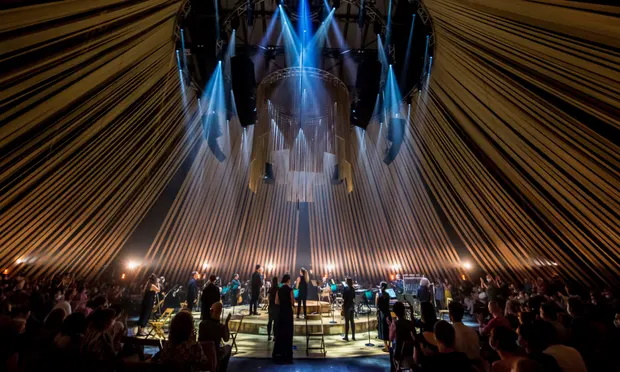
Hugo Ticciati and Manchester Camerata created an intimate space for Manchester International festival from which to evoke the busy harmony of urban wildlife.
Devised by guest director Hugo Ticciati, Manchester Camerata’s festival show, The Patience of Trees, was billed as a meditation on nature and the city; it was structured around Dobrinka Tabakova’s new concerto for violin, strings and percussion which gave its name to the whole concert. Tabakova’s idiom is well-established – sorrowful plainsong-like passages, chugging strings in perpetual motion and heroic sustained solos flying overhead. The piece suited the silvery tone of Ticciati’s violin, even though his enthusiasm threatened to become the piece’s main driving force.
In Manchester Central’s huge space, the festival had created a venue within a venue. Strips of cream cloth were wrapped around a jagged wooden centrepiece, forming an intimate musical cocoon. From within it came two highly commended pieces from the composition competition organised by Ticciati’s Swedish ensemble O/Modernt, adding to the programme’s exploration of urban nature. Paul Saggers’s Vulpes Vulpes conveyed the fantastical drama of a fox dashing around an urban space, hurtling through a multitude of rhythmic themes. Argentinian composer Julieta Szewach’s texturally inquisitive Todo Era Vuelo en Nuestra Tierra (‘‘Everything was flight on our land”) was more focused; both premieres summoned exciting sounds from the Camerata’s small forces.
MIF shows routinely collapse contrasting programmes into single-span “experiences”. Tabakova’s concerto was combined with a twinkling light show, but other curatorial additions were less effective. Breaks between pieces where one might have expected applause were instead filled with improvised noise-scapes. Some worked – particularly when in tandem with lighting – but the majority struggled to paper over the cracks as intended. Steve Reich’s New York Counterpoint (played with a hard edge by clarinettist Fiona Cross) was left a little stranded as a result, heard as another, more prolonged scene-change rather than a standalone statement.
The finale encapsulated a hit-and-miss evening. Tabakova’s haunting Frozen River Flows (heard here in its original oboe and percussion form) concluded the advertised programme with genteel introspection, before a chunk of her concerto reappeared as a postlude to a programme that struggled to make the argument for every component’s essential place.